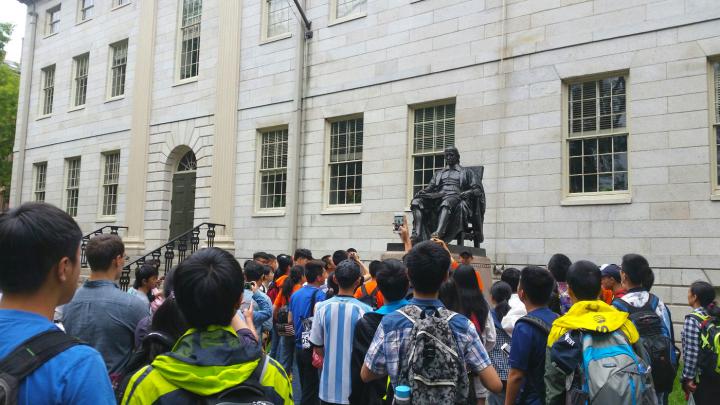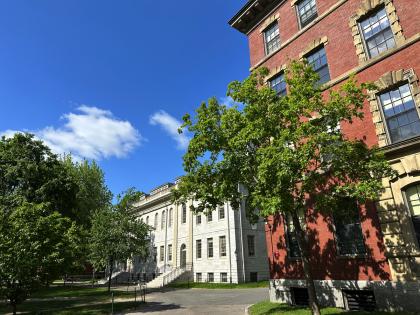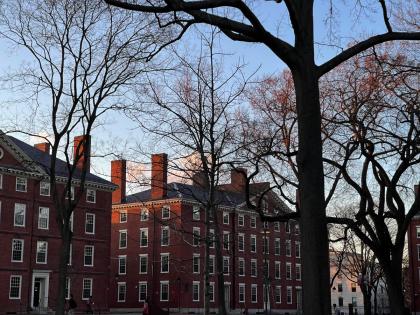Whenever I see throngs of Chinese tourists jostling to take pictures with the John Harvard statue, I am reminded of the Buddhist temples in China that I sometimes visited as a child. Touching the shiny tip of John Harvard’s shoe is almost akin to crouching in front of a golden Buddha—in both cases, worshippers are paying respect in the hope that the act will bring them good luck.
For the Chinese, Harvard is like the Mecca of higher education: the greatest university in the world, worth traveling thousands of miles to visit. The Chinese pilgrims who swarm Harvard Yard today include not just aspiring high-school students and parents, but also random people who just want to “be in the air breathed by the world’s best students,” as a tourist once told me. Every inch of its holy ground must be trod with awe, every building must be photographed.
Partly because Harvard’s Chinese name—Ha Fu—is short, catchy, and easy to pronounce, the University has long been a household name in the Middle Kingdom. Even my aunt, who grows rice in rural China, has heard of Ha Fu. But ask her about Princeton, and she will shake her head. Princeton’s Chinese name, Pu Lin Si Dun, is twice as long, and much harder for people who do not know a word of English to remember.
A sizable part of Harvard’s fame came from a 2000 bestseller, Harvard Girl Liu Yiting: A Character Training Record, written by a Chinese couple whose daughter was admitted to the College. The book, with its cover featuring a beaming Liu posing with her letter of admission, describes the rigorous ways in which she was raised, and has since then been regarded as a parenting bible. It has also kindled the American dream in tens of thousands of impressionable Chinese youths—including me. Reading it during middle school was the first time I’d ever heard of such a place as Ha Fu and other “Ivy League” universities. It helped me realize that if I aspire to receive the best education in the world, the United States is the place to be. I still remember the day when I discovered, to my horror, that China’s top universities, Peking and Tsinghua, were ranked lower than fiftieth in the world.
Last weekend, I met with a group of Chinese high-schoolers on a U.S. college tour, and asked them their impressions of Harvard. “Mysterious,” one suggested. “Unreachable,” said another, with a helpless sigh.
“Mysterious” is certainly an accurate description. Harvard’s libraries alone have been the subject of many far-fetched myths in China that would leave a Westerner aghast. A widely circulated list of 20 adages, purporting to be “mottos written on the wall of a Harvard library,” has found its way into inspirational posters, desktop images, and self-help books. (In fact, they are a collection of clichéd Chinese truisms poorly translated into English, including “Today does not walk, will have to run tomorrow,” and “Happiness may not be ranked, but success will at the top.”) Many Chinese also apparently believe that Harvard students toil away in libraries extremely late every night, as a photo of a crowded reading room allegedly taken in “a Harvard library at 4 a.m.” went viral on the Internet several years ago. (In fact, the room in the picture is not even at Harvard.)
“Unreachable” is largely true as well. Although thousands of students from local high schools in Mainland China apply to Harvard every year, those admitted can usually be counted on one hand. (In my class of 2017, there were four). This means that one American high school alone may send more students to Harvard each year than the world’s most populous country. The competition is only becoming worse, as the number of Chinese students interested in American universities skyrockets.
Because so few Chinese students are admitted to Harvard College (many more are enrolled in the graduate and professional schools), they are treated like minor celebrities in their hometowns, their parents swamped by questions such as “Which SAT camp did your daughter attend?” and “What instrument does she play?” My mother, for example, has been asked by at least three people to share her secrets of parenting success by writing her own version of Harvard Girl.
Whenever I get the chance to communicate with Chinese students, I try to dispel rumors, myths, and false beliefs. Do I stand a higher chance of getting into Harvard if I sign up for math instead of chemistry as my major? No, your major (or “concentration,” as we call it here) is something you choose only in your second year, not something you sign up for in your application (as you do for Chinese universities). Do I need to have a perfect GPA to receive financial aid? No, Harvard has a need-blind financial-aid policy, and merit does not factor in the award decision. How high must my SAT score be in order to get into Harvard? There is no fixed threshold as there is in Chinese universities. Of course, the higher, the better.
Conditioned to an education system where a score in the gaokao (China’s national college-entrance exam) determines everything, most Chinese students and parents still find it hard to grasp concepts such as “liberal-arts education” and “holistic admission process.” But as Chinese youths become increasingly fluent in English and in American culture, more and more are learning to make informed decisions, instead of relying on rankings and hearsay. Sometimes I imagine a day when the ranks of China’s societal and political elites are filled by worldly, Ivy-League-educated individuals. How will today’s study-abroad fad affect tomorrow’s China?
Now, when I see Chinese high-school students touching John Harvard’s toe in a superstitious effort to pull their American dream closer, I say to myself: Maybe one of them will change China’s future.
Zara Zhang ’17 is the Daniel Steiner Undergraduate Editorial Fellow at Harvard Magazine this summer. She spent the first 16 years of her life in Changchun, China, where her family still lives.








